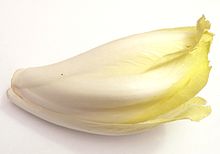endive
Jump to navigation
Jump to search
English
[edit]
Alternative forms
[edit]Etymology
[edit]From Middle French endive, from Medieval Latin endivia or Italian indivia or endivia, from Late Latin intibus.
Pronunciation
[edit]- (US) IPA(key): /ˈɛndaɪv/, /ɒnˈdiːv/
- (UK) IPA(key): /ˈɛndaɪv/, /ˈɛndɪv/, /ˈɒndiːv/
Audio (Southern England): (file) - Rhymes: (US) -iːv
Noun
[edit]endive (countable and uncountable, plural endives)
- A leafy salad vegetable, Cichorium endivia, which is often confused with common chicory (Cichorium intybus).
- 1787, Charlotte Mason, The Lady's Assistant for Regulating and Supplying the Table[1], page 192:
- When all this is ready, take some endive and Dutch lettuce, some chervil and celery, wash and drain them very well, cut them small, put them into a saucepan, and pour some of the broth upon them […]
- 1805, William Augustus Henderson, The Housekeeper's Instructor, Or, Universal Family Cook[2], page 110:
- Take the three heads of endive out of the water, drain them, and leave the largest whole.
- 1915 August 28, Marion Harris Neil, “When Lettus is Scarce”, in The Country Gentleman[3], volume 80, page 1379:
- Broad leaved, green curled or white curled, the endive plants are good; the green sorts, on account of their coolness and their plentiful salts, are esteemed for the salad bowl, and the white-curled sorts are liked for soups, stews and as boiled vegetables.
- 2001, Clifford A. Wright, Mediterranean Vegetables[4], page 146:
- Endive and escarole are the same vegetable, but endive has leaves that are cut and curled, while escarole has smooth, broad leaves.
Hyponyms
[edit]- (Cichorium endivia): curly endive, escarole, frisée lettuce, frisée; broad-leaved endive
Derived terms
[edit]- Belgian endive (from Cichorium intybus)
Translations
[edit]leafy salad vegetable, Cichorium endivia
|
See also
[edit]Further reading
[edit]Anagrams
[edit]French
[edit]
Etymology
[edit]Inherited from Middle French endive, endivie, andive, indivie, from Medieval Latin endivia or Italian indivia or endivia, suspected via Byzantine Greek ἐντύβιον (entúbion) from Latin intibus.
Pronunciation
[edit]Noun
[edit]endive f (plural endives)
- (cooking) Belgian endive (edible chicory bud of Cichorium intybus)
- Synonym: chicon
- Une salade d’endive.
- (please add an English translation of this usage example)
Usage notes
[edit]In a strict botanical sense, French endive or English Belgian endive is actually not an endive (of the species Cichorium endivia) but a common chicory (Cichorium intybus).[1]
Descendants
[edit]- → Iranian Persian: آنْدیوْ (ândiv)
See also
[edit]References
[edit]- ^ Régis Thomas (2017 April 24 (last accessed)) “Chicorée et endive”, in (Please provide the book title or journal name)
Further reading
[edit] endive on the French Wikipedia.Wikipedia fr
endive on the French Wikipedia.Wikipedia fr- “endive”, in Trésor de la langue française informatisé [Digitized Treasury of the French Language], 2012.
Categories:
- English terms derived from Middle French
- English terms derived from Medieval Latin
- English terms derived from Italian
- English terms derived from Late Latin
- English 2-syllable words
- English terms with IPA pronunciation
- English terms with audio links
- Rhymes:English/iːv
- Rhymes:English/iːv/2 syllables
- English lemmas
- English nouns
- English uncountable nouns
- English countable nouns
- English terms with quotations
- en:Cichorieae tribe plants
- en:Vegetables
- French terms inherited from Middle French
- French terms derived from Middle French
- French terms derived from Medieval Latin
- French terms derived from Italian
- French terms derived from Byzantine Greek
- French terms derived from Latin
- French 2-syllable words
- French terms with IPA pronunciation
- French terms with audio links
- French lemmas
- French nouns
- French countable nouns
- French feminine nouns
- fr:Cooking
- French terms with usage examples
- fr:Vegetables